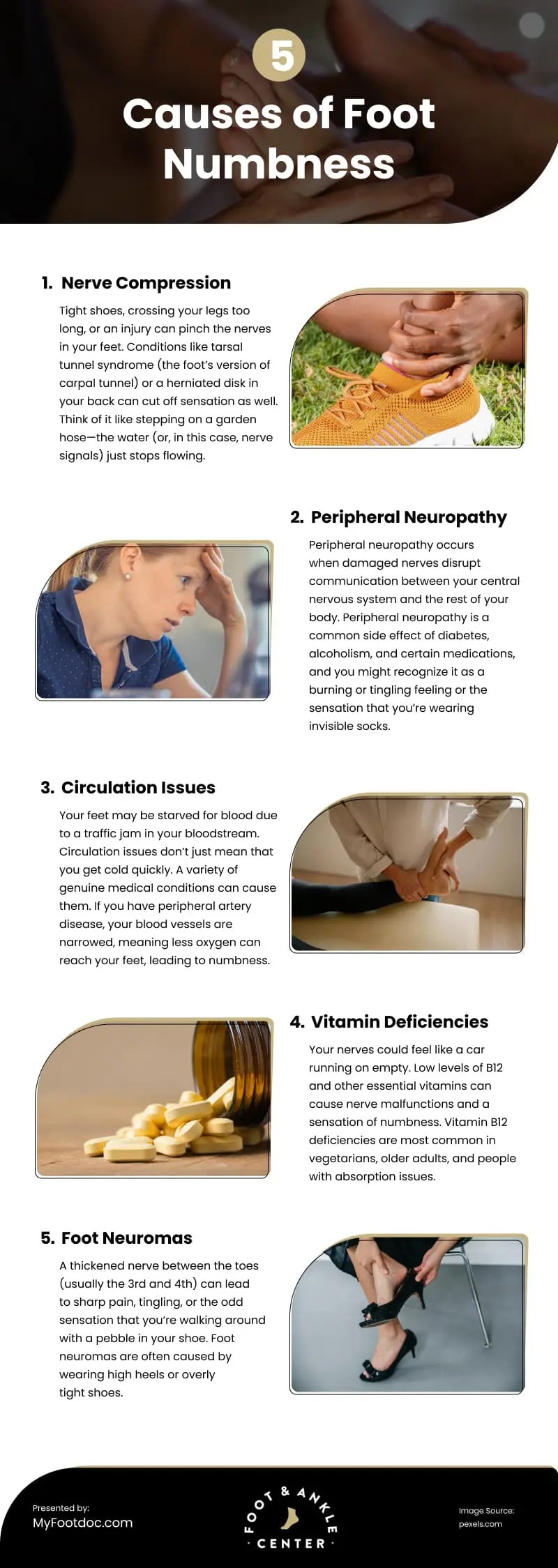Ever wake up with a foot that feels like it belongs to someone else? Or take a step and wonder if your toes have suddenly lost Bluetooth connectivity?
A little tingling now and then might be no big deal, but it’s time to pay attention when that numbness lingers. Your feet may not just be taking a nap—they could be signaling something more serious. That’s when it’s time to contact a foot doctor in Mesquite.
Let’s explore why your feet might be playing dead and, more importantly, what you can do to wake them up.
Common Causes of Foot Numbness
We’ve all experienced the classic “slept on it funny” syndrome, but if your feet feel numb on the regular, there may be something else going on.
1. Nerve Compression
Tight shoes, crossing your legs too long, or an injury can pinch the nerves in your feet. Conditions like tarsal tunnel syndrome (the foot’s version of carpal tunnel) or a herniated disk in your back can cut off sensation as well. Think of it like stepping on a garden hose—the water (or, in this case, nerve signals) just stops flowing.
2. Peripheral Neuropathy
Peripheral neuropathy is like your nerves putting a hold on their mail—they just stop taking messages. It’s a condition where the nerves are damaged, disrupting your central nervous system’s communication with the rest of your body.
Peripheral neuropathy is a common side effect of diabetes, alcoholism, and certain medications, and you might recognize it as a burning or tingling feeling or the sensation that you’re wearing invisible socks.
3. Circulation Issues
Your feet may be starved for blood due to a traffic jam in your bloodstream. Circulation issues don’t just mean that you get cold quickly. A variety of genuine medical conditions can cause them.
If you have peripheral artery disease, your blood vessels are narrowed, meaning less oxygen can reach your feet, leading to numbness. Raynaud’s phenomenon happens when extreme cold or stress makes blood vessels clamp down, turning your toes white, blue, and numb.
4. Vitamin Deficiencies
Your nerves could feel like a car running on empty. Low levels of B12 and other essential vitamins can cause nerve malfunctions and a sensation of numbness. Vitamin B12 deficiencies are most common in vegetarians, older adults, and people with absorption issues.
Asking your feet to work without the right vitamins is like trying to run your phone on a 1% battery—things get glitchy fast.
5. Foot Neuromas:
A thickened nerve between the toes (usually the 3rd and 4th) can lead to sharp pain, tingling, or the odd sensation that you’re walking around with a pebble in your shoe. Foot neuromas are often caused by wearing high heels or overly tight shoes. Sorry, fashion lovers—beauty is a pain for your feet.
How to Wake Up Your Sleeping Feet
Waiting for your feet to feel better doesn’t always do the trick. Here are just a few ways to put your best foot forward.
1. Lifestyle Tweaks
Even making small changes in your lifestyle can lead to huge amounts of relief. For example, drinking alcohol in excess can worsen nerve issues, so cutting back could help with nerve-related numbness.
Wearing tight, uncomfortable shoes every day is like wearing a straightjacket for your feet—your muscles and nerves will be screaming by the end. Instead, wear roomier, supportive shoes—your toes deserve space to breathe.
If you sit for long periods throughout the day, build in time to move around often to keep your circulation flowing. Whether it’s taking the stairs instead of the elevator or walking around the office during a call, a little movement can make a big difference.
2. Home Remedies
Home remedies are no magic cure, but they’re often worth a try. Try ice packs for foot inflammation or warm soaks to boost blood circulation. Foot massages can stimulate the nerves and reduce tension in the feet. Plus, they’re a great way to pamper yourself.
3. Medical Treatment
Physical therapy (PT) can help with nerve compression or damage issues, so if you’re consistent with your PT regimens, you may be able to strengthen your muscles and improve circulation over time. Simply search for “foot and ankle care near me” to get started.
Your provider may prescribe medication for underlying causes of your foot numbness. Pain relievers and anti-inflammatory drugs could help with discomfort and conditions like neuropathy. A doctor may also prescribe you antidepressants to treat nerve-related pain.
Surgical interventions are also possible. For conditions like tarsal tunnel syndrome, decompression surgery could help you feel better by removing pressure from the nerve and restoring proper function.
When to Call the Podiatrist
Look, just because we’ve all Googled our symptoms at 2 am and started panic spiraling doesn’t mean you have to for your foot numbness, too. Seek medical attention for the best advice and chance for relief.
If the numbness persists or worsens, it’s time to visit the foot doctor. If you have diabetes or another condition that puts you at risk for nerve damage, get your feet checked sooner rather than later to start on a diabetic neuropathy treatment.
Getting Back on Your Feet
Foot numbness might be a temporary annoyance, but it’s not something to ignore if it sticks around for a long time. If your feet have been giving you the silent treatment way too often, it’s time to check in with a podiatrist and get to the root of the issue.
The good news? Many causes are treatable, and the right interventions can bring your feet back to life. Whether with the help of a podiatrist’s custom orthotics, medication, lifestyle changes, or therapy, you can be footloose and fancy-free again.
Video

Infographic
Have you ever woken up with a foot that feels strange or taken a step and felt like your toes were disconnected? Occasional tingling is usually harmless, but persistent numbness should be taken seriously. Learn about the common causes of foot numbness in the infographic below.




